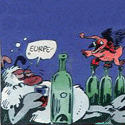|
Arquinsiel posted:It is in fact referred to as "an invasion of airspace" though. I get your reading of the word, but it's imprecise and leads to bad logic. In a similar way people talk about Germany's invasion of north Africa, when German forces were invited into an Italian colonial possession on the coast and then invaded neighbouring African countries from that position. The flipside of that is that they must also have invaded Europe, despite starting in Europe. Maybe good enough for facebook discussions of history but here we usually manage better. In my head they don't need to be trying to hold the territory indefinitely, but they do need to attempt to - at least temporarily - intend to expel enemy forces from the location being invaded and be replaced by their own or allied forces. If we're being extremely pedantic I'd argue that the Germans didn't invade Europe and instead they invaded France, Poland, etc. How would you define invasion?
|
|
|
|

|
| # ? Jun 9, 2024 08:04 |
|
turn it up TURN ME ON posted:So I'm slowly making my way through Post Captain after reading Master and Commander, and I find myself very confused about the purpose and use of the Polychrest's "secret weapon". It's described as a large tube in the middle of the ship that fires a tailless rocket - what does that even mean? Is it supposed to stand in for any real weapon? I found this link: https://en.wikipedia.org/wiki/HMS_Polychrest
|
|
|
|
Love too do crimes Eela6 posted:Could anyone talk about the military structure and/or technology of the Khazars? I never even knew they existed until recently, but they're a fascinating group*. Yes, sort of. They were not too unlike the steppe nomads that came after them or before them: lots of lamellar, sabres, narrow-bladed axes, composite bows etc. All the information of any substance I have comes from this book: https://www.amazon.com/Companion-Medieval-Arms-Armour/dp/0851158722 which is pretty interesting even if the information is out of date in places. I'll make a follow-up post after I've re-read the relevant articles, just wanted you to know that there are in fact answers to your questions.
|
|
|
|
turn it up TURN ME ON posted:So I'm slowly making my way through Post Captain after reading Master and Commander, and I find myself very confused about the purpose and use of the Polychrest's "secret weapon". It's described as a large tube in the middle of the ship that fires a tailless rocket - what does that even mean? Is it supposed to stand in for any real weapon? Congreve rockets? https://en.wikipedia.org/wiki/Congreve_rocket
|
|
|
|
Hogge Wild posted:I found this link: https://en.wikipedia.org/wiki/HMS_Polychrest That does give a little bit of information, I guess it was just fiction for the purposes of the novel. Nenonen posted:Congreve rockets? Congreve rockets are actually mentioned, as their inventor was on hand to watch the exhibition of this new secret weapon, and was against it. To me it sounds like they were trying for an early type of boat-based heavy howitzer, where the shells were self-propelled.
|
|
|
|
Elyv posted:In my head they don't need to be trying to hold the territory indefinitely, but they do need to attempt to - at least temporarily - intend to expel enemy forces from the location being invaded and be replaced by their own or allied forces. If we're being extremely pedantic I'd argue that the Germans didn't invade Europe and instead they invaded France, Poland, etc.
|
|
|
turn it up TURN ME ON posted:So I'm slowly making my way through Post Captain after reading Master and Commander, and I find myself very confused about the purpose and use of the Polychrest's "secret weapon". It's described as a large tube in the middle of the ship that fires a tailless rocket - what does that even mean? Is it supposed to stand in for any real weapon? My impression is that (at least part of) the point of Polychrest's secret weapon's strange description is to instill in the reader the same sort of confusion it creates in the characters.
|
|
|
|
|
poo poo I'm reading now: The Wages of Destruction The economic history of the Third Reich is very interesting but obviously very complected. I gotta give the author credit: the book was published in 2007, but he manages to explain how government spending does not necessarily crowd out private investment quite well. The Nazis (as y'all know) red-lined their economy for massive arms production, and expanded their aircraft industry a hundred-fold from 1933. Amusingly the armaments push often gets sidelined for macroeconomic issues - maintaining a foreign currency reserve and exporting. Steel production especially often was taken away from the military because it could be sold on the international market. The Nazis also abandoned the free market in a lot of ways, often choosing bureaucracy and command economics, which was effective in a few ways but often ended up hobbling the German economy. Nazism itself actually interfaces with economics in some freaky ways, too. They viewed their backward farming sector as necessitating lebenstraum - this was for the usual hosed up racial/imperialist reasons, but also because the Nazis had a fundamental distrust of international trade solving problems. This was also for hosed up racial reasons - obv. if Germany ever got good at international trade, international Jewery would attack Germany militarily. Still, in the decision of free market vs. protectionism it made the decision for the Nazis. The military build up also did a lot to decide when the war actually started. The sheer cost of the military expansion meant that if it was not used in fairly short order, the sheer drain on the economy would be nasty. In addition, huge military expansions made surrounding nations much more hostile (and thus put Hitler increasingly in positions where he's be all either this or WAR, not that a guy who's base motives included genocide would have been easy to get along with otherwise.) Two anecdotes for the thread. First, in 1938 the Nazis had completely used up their labor market. The response here was obviously to bureaucratize the labor market - people had to keep official 'job books' and in high demand positions needed government permission to quit. (Nobody tell Canada this, it seems like they'd be into it.) Anyway, Berlin was a particularly hot job market; the sum total of unemployed people was 35,000, of which only 6000 or so were fully fit. quote:Of these, at least a third were 'artistic professionals', would-be actors and musicians, who as paid up members of the Reich's corporation of artistic workers enjoyed a protected status. Dealing with the bohemian residuum posed a special problem for the officials of the Berlin labor exchanges, who faced 'fits of temper' and 'time consuming complaints' , if a change of profession was 'even suggested.' At a time of national emergency, the Berlin trustee of labor was moved to the philistine observation that it was surely unacceptable that 'such a large number of fully fit Volksgenossen should be exempt from...radical occupational redirection'. Also, Hermann Goering bitching about Kristallnacht and how hard it is on him. quote:Three days after the pogrom, on 12th November, Goering asserted his authora-taugh with a major conference on the Jewish question. As head of the Four Year Plan [take two on making the German economy produce the 'uuugest, most luxurious military] Goering was indignant at the wanton damage to property over the previous days. 'I have had enough of these demonstrations! They don't harm the Jew, but me, who am in the last authority for coordinating the German economy.' Goering was incensed by the furs and the jewels looted in Berlin and issued special orders for the arrest of the persons responsible. More seriously, Germany's streets were littered with derbies of thousands of smashed shop windows. The Jews would pay the bill for cleaning up the mess, but replacing the high quality Belgian plate glass would cost 3 million Reichmarks in precious foreign exchange. As Goering put it: 'I wish you had killed 200 Jews, and not destroyed such values.'
|
|
|
|
Waci posted:Sure, sorry. The point I was trying to make with that post was that targeting exclusively shipping directly related to the war effort or colonialism is not the same as targeting anything that could theoretically be related with little regard for the likelihood of it being a civilian target, but I'll admit in retrospect that was a disastrous attempt at trying to make that point. Unrestricted submarine warfare refers to the doctrine of declaring a 'war zone' within which ships belonging to an enemy or aligned neutral that violate this area are assumed to be part of the war effort and may be attacked with torpedos without warning, as opposed to the previous doctrine where the submarine would surface, issue a warning, give the ship a chance to surrender, board and search the vessel for contraband, and then escort the vessel back to a home port as a prize. Even within the warzone submarines and torpedos were in short supply so submarines were told to prioritise enemy capital ships, freighters and especially oil tankers. Not shoot randomly at schoolkids. The real civilian toll of the doctrine is the effects of the blockade on Japanese in the home isles. Fangz fucked around with this message at 00:08 on Oct 11, 2016 |
|
|
|
Fangz posted:Unrestricted submarine warfare refers to the doctrine of declaring a 'war zone' within which ships belonging to an enemy or aligned neutral that violate this area are assumed to be part of the war effort and may be attacked with torpedos without warning, as opposed to the previous doctrine where the submarine would surface, issue a warning, give the ship a chance to surrender, board and search the vessel for contraband, and then escort the vessel back to a home port as a prize. Even within the warzone submarines and torpedos were in short supply so submarines were told to prioritise enemy capital ships, freighters and especially oil tankers. Not shoot randomly at schoolkids. It should also be noted that the blockade zone is widely publicized. The Germans took out newspaper adds to the effect of "don't get on a boat bound for England" in major US newspapers in both WW1 and WW2 before the US got in. You can argue about whether it's a good thing or not to try to starve a country out economically, as there are some very real civilian hardships involved (e.g. Berlin, 1918), but if you decide to get on a boat going to London in 1940 it's not like you're unaware of the possible consequences.
|
|
|
|
Anyone have a good suggestion for a general history of the Ottoman empire?
|
|
|
|
NLJP posted:Anyone have a good suggestion for a general history of the Ottoman empire? You'd probably be better off targeting a specific time period as that was quite a long-lived empire with many different distinct eras.
|
|
|
|
I did look up the Tsushima Maru incident, FWIW. The children in that incident were being transported on an armed IJA troop transport in a convoy with destroyer escort. It was just bad luck that of the three freighters in the convoy, the one that was sunk was the one with children on it. It doesn't really seem like the sort of thing that could be avoided by being more careful. The news was covered up by the imperial Japanese government to preserve morale until twenty years later. http://ww6.enjoy.ne.jp/~iwashige/tsushimamaru.htm
|
|
|
|
OpenlyEvilJello posted:My impression is that (at least part of) the point of Polychrest's secret weapon's strange description is to instill in the reader the same sort of confusion it creates in the characters. That's a really loving good point. I really hope that is intentional, because drat if it works. Just like how he assumes actions happen during dialog.
|
|
|
|
Fangz posted:I did look up the Tsushima Maru incident, FWIW. The children in that incident were being transported on an armed IJA troop transport in a convoy with destroyer escort. It was just bad luck that of the three freighters in the convoy, the one that was sunk was the one with children on it. And, as others pointed out, the Lusitania was carrying weapons. This was known at the time. That did not stop its sinking from becoming the centerpiece of a vast propaganda campaign. You're getting into some thorny moral issues which I don't really have a right to discuss, especially along the lines of "two wrongs make a right".
|
|
|
|
KYOON GRIFFEY JR posted:You'd probably be better off targeting a specific time period as that was quite a long-lived empire with many different distinct eras. I'd assume with near certainty he means Constantinople to Ataturk or so but you never know in this thread.
|
|
|
|
Fangz posted:The specific argument I'm making is not that it's not a war crime because the British colonial powers were morally better than Japan, but that the situations are not comparable because the specific traffic that was being intercepted in the Atlantic was different from the traffic that was being intercepted in the Pacific. The latter constituted the proceeds of war crimes and thus can be claimed to be acting to hinder that sort of activity. If the KM was preventing the British from expropriating materials from India, say, that would be more similar. This, I think, is problem people are having, since the British were 100% pulling a poo poo load from their colonies and what wasn't was poo poo they were paying for by way of second or third order by way of profits made off the colonies. It's not like the KM was trying to save India or anything (I mean, Japan made some lackadaisical efforts for rhetorical reasons) but nor were the allies doing this to save the poor Chinese. They had a chance to intervene before; instead they fell into the war when their own colonies came under attack.
|
|
|
|
Nebakenezzer posted:The Nazis also abandoned the free market in a lot of ways, often choosing bureaucracy and command economics, which was effective in a few ways but often ended up hobbling the German economy. Nazism itself actually interfaces with economics in some freaky ways, too. They viewed their backward farming sector as necessitating lebenstraum - this was for the usual hosed up racial/imperialist reasons, but also because the Nazis had a fundamental distrust of international trade solving problems. The distrust of international trade, especially regarding the agrarian sector stems directly from the experiences of the Hungerwinter in WW1. It is a mighty theme in the NS worldview, one of the main reasons that they used to explain the collapse of the homefront. Is there more elaboration why the farming sector was considered backwards? I recall reading that they lacked machinery and automatisation and experienced a shortage in fertilizer production as these resources were redirected to armaments even before the war. Also working with relatively poor soils.
|
|
|
|
NLJP posted:Anyone have a good suggestion for a general history of the Ottoman empire? Osman's dream was quite a good read! https://www.amazon.com/Osmans-Dream-History-Ottoman-Empire/dp/0465023975
|
|
|
|
Is there any deeper background/context to organizational divisions coming up in threes? Three men to a fireteam, three fireteams to a squad, three squads to a platoon ... up to three divisions to a corps, three corps to an army, three armies to an army group, and so on.
|
|
|
|
gradenko_2000 posted:Is there any deeper background/context to organizational divisions coming up in threes? Three men to a fireteam, three fireteams to a squad, three squads to a platoon ... up to three divisions to a corps, three corps to an army, three armies to an army group, and so on. Yes, it's part of a broader memetic force known as the Rule of Three. I'm not sure how big a deal it is, but allegedly human brains have an easier time remembering and doing things if they come in threes. In the military, where fast response is of paramount importance, it's the thing to do. E: oh yeah, in the modern age it's also a handy tactical shape of advance - you deploy three platoons or squads in the shape of a triangle, with the one on point being at the front of the direction of advance. When it makes contact with the enemy, it can safely draw back while the other platoons/squads enfillade fire or ambush the contact. Tias fucked around with this message at 11:24 on Oct 11, 2016 |
|
|
|
gradenko_2000 posted:Is there any deeper background/context to organizational divisions coming up in threes? Three men to a fireteam, three fireteams to a squad, three squads to a platoon ... up to three divisions to a corps, three corps to an army, three armies to an army group, and so on. I think its generally how many subordinates you can keep track of at any given time. Also depending on the time period/force involved it also is doctrine based i.e. having two companies online and having one in reserve.
|
|
|
|
doble poest
|
|
|
|
gradenko_2000 posted:Is there any deeper background/context to organizational divisions coming up in threes? Three men to a fireteam, three fireteams to a squad, three squads to a platoon ... up to three divisions to a corps, three corps to an army, three armies to an army group, and so on. *in some armies at certain times Compare contemporary US Army's vs. US Marine Corps' squad structures for instance. Or how in preceding centuries a regiment could have two or four battalions. Also it's usually not strictly divisible by three if you consider all supporting formations. For example an infantry division typically included three infantry regiment and an artillery regiment. The components above division level also aren't set in stone so that a corps, army or army group can be almost any kind of ad hoc command given a certain task and operational area. But in the medium range, battalion to regiment level nowadays, it's pretty much a rule of thumb and I think dates back centuries when it was realized that three maneuver elements was the optimal amount of separate moving parts for a commander to manage, and then allowed for one forward-two back or two forward-one back deployments and rotation of reserve. Tias posted:Yes, it's part of a broader memetic force known as the Rule of Three. I'm not sure how big a deal it is, but allegedly human brains have an easier time remembering and doing things if they come in threes. In the military, where fast response is of paramount importance, it's the thing to do. I would avoid trying to understand eg. Soviet tank company structure (3 men per tank, 3 tanks per platoon, 3 platoons per company) from some  angle where Russian officers have a worse memory than western tank commanders who had more men and more tanks per comparable unit. angle where Russian officers have a worse memory than western tank commanders who had more men and more tanks per comparable unit.
|
|
|
|
JaucheCharly posted:Is there more elaboration why the farming sector was considered backwards? I recall reading that they lacked machinery and automatisation and experienced a shortage in fertilizer production as these resources were redirected to armaments even before the war. Also working with relatively poor soils. Somebody earlier in the thread explained this (and I'm just paraphrasing them:) the Germans since Bismark heavily protected their agricultural sector, which kept consolidation and mechanization from happening. This meant that Germany had lots of tiny farms that were very manual labor intensive. This was not only a inefficient use of manpower, it was also less productive. It was also reliant on exports for fertilizer and animal feed. Naturally, the solution to these problems was Lebenstraum, not market reforms. During the peacetime Reich, they also bureaucratized the gently caress out of agriculture, stripping it of whatever market forces were still in the system. This also sapped efficiency.
|
|
|
|
JaucheCharly posted:The distrust of international trade, especially regarding the agrarian sector stems directly from the experiences of the Hungerwinter in WW1. It is a mighty theme in the NS worldview, one of the main reasons that they used to explain the collapse of the homefront. Essentially German interwar agriculture had the following problems: 1. Farmers made up a much larger percentage of the vote than most countries in Europe, which meant political parties had to pander to them, usually by preventing outside competition from affecting German farmers, making the German agricultural sector inefficient. 2. Farming was still very much a family/semi-subsistence thing for a lot of people, so there was not the economy of scale being achieved in other countries with larger, more industrial scale farms. 3. Farms themselves were split up into many, many tiny plots based on often centuries old private ownership. This is covered more in the video below but farms were often both too small to really provide a decent living for the people farming them and simultaneously so spread out that it would take 10 hours to travel between them all, all the while being made up of plots too small to use proper mechanization on. 4. There not being much money to spend on mechanization and technological advantages as you pointed out. e:f,b I've posted it before but here is a lecture by Adam Tooze (of Wages of Destruction) on German agriculture between the wars and attempts to reform it
|
|
|
|
Nenonen posted:*in some armies at certain times The traditional structure for battles going back a very long time is center and two wings as separate maneuver elements. I like to think there's some relationship.
|
|
|
|
I'm pretty sure there's some good work with chimpanzee memory and threes, suggesting that it's a primate trait. Will dig it out.
|
|
|
|
a battalion overlaps with a regiment! there are a variable number of companies to the regiment, from one or two to more than ten! there are five soldiers to the rotte! what is all this rule of threes thing
|
|
|
|
HEY GAL posted:a battalion overlaps with a regiment! there are a variable number of companies to the regiment, from one or two to more than ten! there are five soldiers to the rotte! what is all this rule of threes thing I chased a rotte out of my teachers house this sunday, good times.
|
|
|
|
HEY GAL posted:a battalion overlaps with a regiment! there are a variable number of companies to the regiment, from one or two to more than ten! there are five soldiers to the rotte! what is all this rule of threes thing the battalion is the field-deployable body of troops and the regiment is the administrative cadre responsible for raising and organizing the battalion(s). everyone knows this.
|
|
|
|
I kinda feel like the 'rule of three' speaks more to the pattern recognition of people studying this stuff, than anything else. We ignore that WWII US armoured infantry has two rifle squads. We ignore that there's nine riflemen to a squad. We ignore that a MG squad has two gunners, that the Luftwaffe flew in the finger-four formation, 11 carrier strike groups, etc etc etc
|
|
|
|
Nine riflemen is three times three
|
|
|
Arquinsiel posted:Nine riflemen is three times three 9x3 on the field 9x3 last to leave.
|
|
|
|
|
lenoon posted:I'm pretty sure there's some good work with chimpanzee memory and threes, suggesting that it's a primate trait. Will dig it out. God created primates as his image, and God is Father, Son and Holy Spirit in one. Hence we form into trinities when we fight against forces of evil. Checks out!
|
|
|
|
Straight from the wikipedia page for the Montana battleship design:quote:The final type of ammunition developed for the 16-inch guns, well after the Montanas had been cancelled, were W23 "Katie" shells. These were born from the nuclear deterrence that had begun to shape the US armed forces at the start of the Cold War. To compete with the Air Force and the Army, which had developed nuclear bombs and nuclear shells for use on the battlefield, the Navy began a top-secret program to develop Mk. 23 nuclear naval shells with an estimated yield of 15 to 20 kilotons. The shells entered development around 1953, and were reportedly ready by 1956; however, only the Iowa-class battleships could have fired them Can someone elaborate on the history of nuclear ordinance delivery outside of 'drop it in a bomb from a plane' and missiles (of any range)? I know there were nuclear capable artillery pieces. But are there any other odd ducks like trying to launch 16 inch nuclear naval shells?
|
|
|
|
There were certainly nuclear torpedoes; the subs the Soviets had deployed to avoid the Cuban Missile Crisis blockade were armed with them.
|
|
|
|
|
Ice Fist posted:Straight from the wikipedia page for the Montana battleship design: Why yes. There were nuclear torpedos, nuclear land mines, nuclear demolition charges, nuclear recoilless rifles, and nuclear ramjet engines (this is actually pretty destructive as a weapon, and propulsion!) Basically anything you could think of that could hold a nuclear warhead had plans to be nuclear-ized. https://en.wikipedia.org/wiki/Nuclear_torpedo https://en.wikipedia.org/wiki/Atomic_demolition_munition https://en.wikipedia.org/wiki/Special_Atomic_Demolition_Munition https://en.wikipedia.org/wiki/Davy_Crockett_(nuclear_device) https://en.wikipedia.org/wiki/Project_Pluto
|
|
|
|
Ice Fist posted:Straight from the wikipedia page for the Montana battleship design: The Davey Crockett, which was a tiny recoilless gun which fit on the back of a jeep. In case you really want to detonate a nuke less than 2 miles from your own location while in an open topped vehicle.
|
|
|
|

|
| # ? Jun 9, 2024 08:04 |
|
Disinterested posted:There were certainly nuclear torpedoes; the subs the Soviets had deployed to avoid the Cuban Missile Crisis blockade were armed with them. How the gently caress does that work?  Is it just a case of "gently caress you, gently caress your entire fleet, I don't care how heavily armored you are and whether or not I'll survive"? Is it just a case of "gently caress you, gently caress your entire fleet, I don't care how heavily armored you are and whether or not I'll survive"?
|
|
|









































